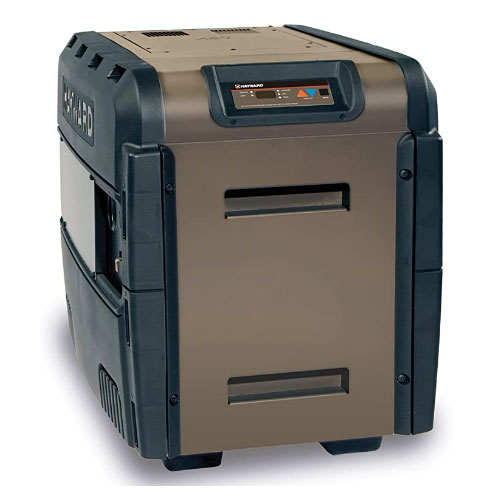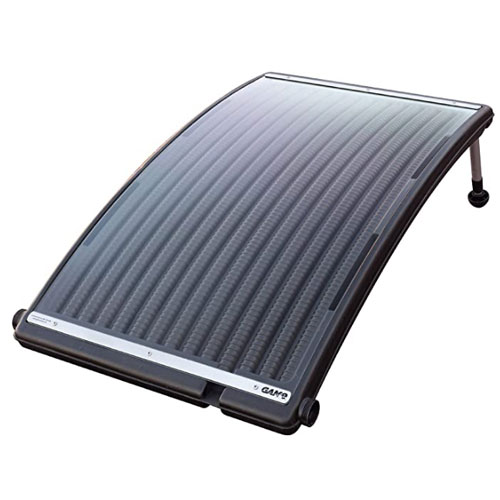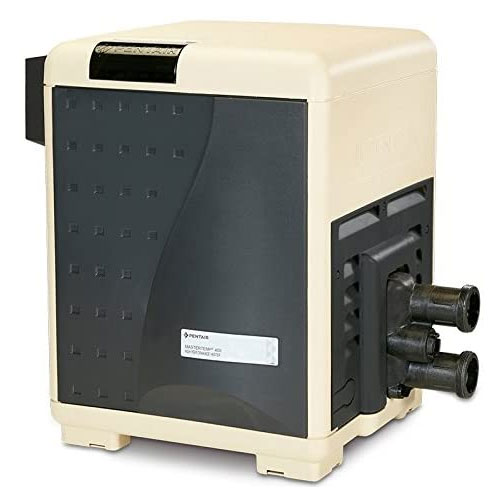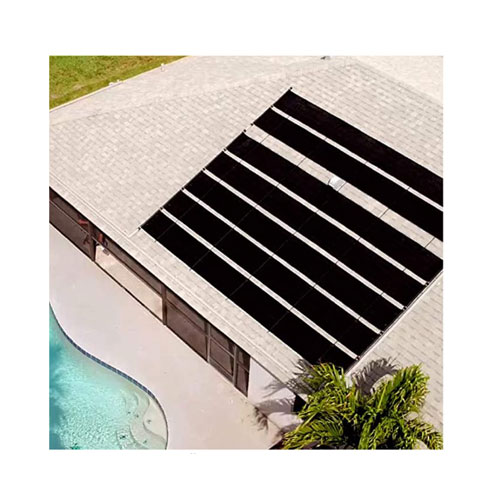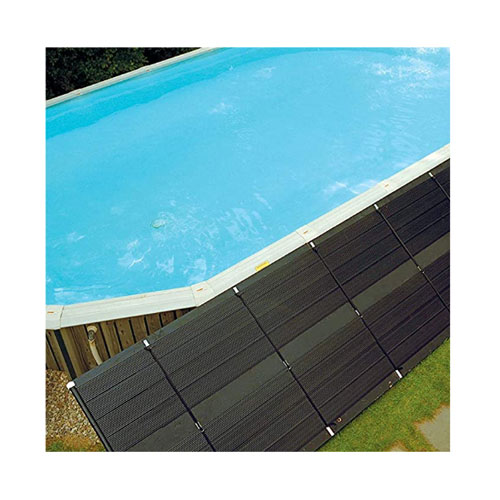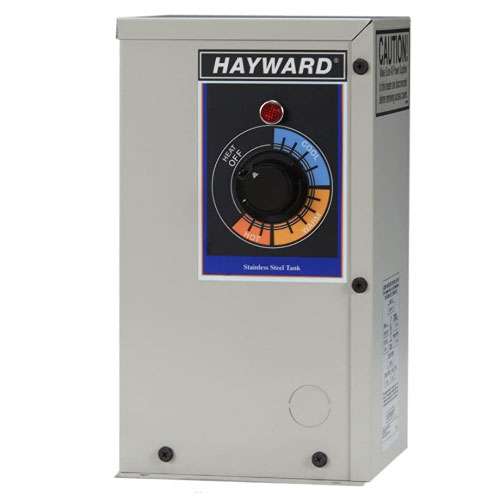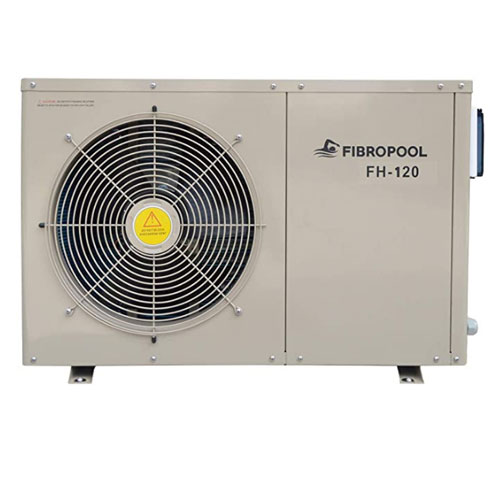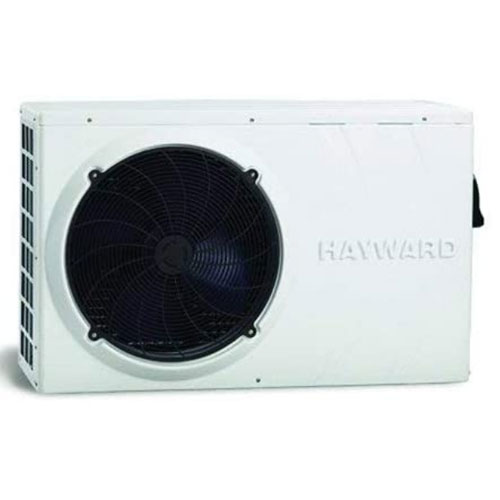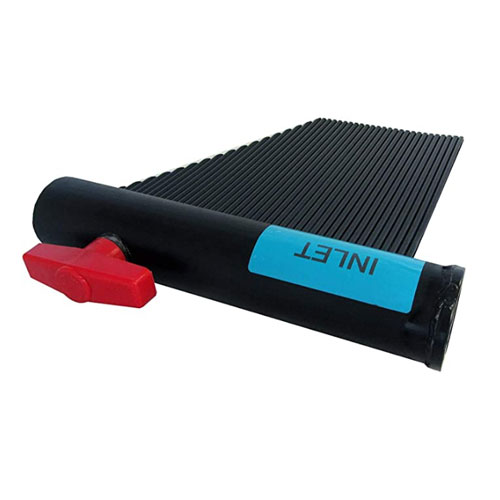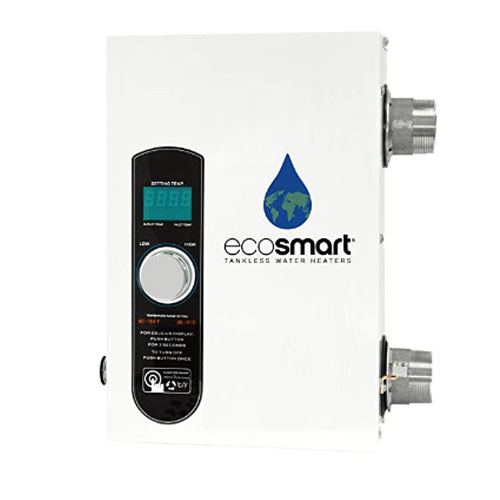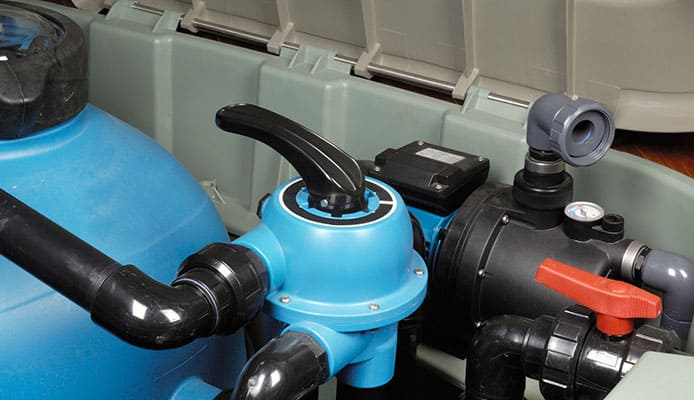
-
1.
-
2.
-
3.
-
4.
-
5.
We can all agree that nobody enjoys swimming in a cold pool. If you’re in a colder climate or you simply want to extend the swimming season, you should consider getting a pool heater. Three types of pool heaters are available on the market today – gas, solar, and electric.
While they all serve the same purpose (heating the pool water), the way they operate is very different. Finding a pool heater depends on many factors including pool size and climate, so one of these types might be better for your pool than others.
Since pool heaters are fairly expensive, our buying guide explains what each heater can do as well as its downsides. And, whether you’re after the best above ground pool heater or a great in-ground model, the guide takes the budget into consideration too. If you need something reliable and efficient straight away, check out the best pool heaters we carefully selected for our list.
OUR TOP PICK
Hayward H150FDN H-Series Natural Gas
- Stand Out Features - Why We Love It
- Digital LED panel for controlling the operation
- Environmentally-conscious low Nox emissions
- Works with both 110 and 220V power supply
- High-quality nickel heat exchanger, igniters, and burners
- Top-level hydraulic performance reduces circulation time
Type: Gas
Btu output: 150,000
Emissions: Low NOx
Dimensions: 31.4 x 26.7 x 23.5 inches
Weight: 110 pounds
Warranty: 1 year
EDITORS CHOICE
GAME 4721-BB SolarPRO
- Stand Out Features - Why We Love It
- Curved shape creates better sun exposure
- Transparent top cover traps more heat
- Adjustable legs for changing the panel angle
- Multiple panels can be paired together
- Designed for above ground pools
Type: Solar
Efficiency: 5°F in 4 days (8,000-gallon pool)
Dimensions: 27.6 x 5.9 x 44.9 inches
Weight: 12.45 pounds
BEST VALUE
Pentair 460805 MasterTemp Natural Gas
- Stand Out Features - Why We Love It
- Fantastic heat output warms even the largest pools
- Impressive energy efficiency for its type
- Manual shut-off function for gas
- Certified environmentally-safe low Nox emissions
- Compact design with extra-quiet operation
Type: Gas
Btu output: 400,000
Emissions: Low NOx
Dimensions: 36 x 25 x 30 inches
Weight: 127 pounds
Warranty: 2 years
SmartPool SunHeater S601P Solar
- Stand Out Features - Why We Love It
- Highly-efficient polypropylene panels
- Direct flow system for more efficient heating
- Raises pool heat up to 10 degrees
- Great for smaller in-ground pools
- Lightweight and easy to install
Type: Solar
Efficiency: 6-10°F
Panel material: Polypropylene
Dimensions: 20 x 4 feet
Weight: 29 pounds
SmartPool SunHeater S240U Solar
- Stand Out Features - Why We Love It
- Durable polypropylene panels withstand harsh weather
- Tube-on-web design increases panel surface area
- Flexible threaded headers for easier connecting
- Separate header hole for every heating tube
- Works with both in-ground and above ground pools
Type: Solar
Efficiency: 6-10°F
Panel material: Polypropylene
Dimensions: 2 x 20 feet (two)
Weight: 18 pounds
- Stand Out Features - Why We Love It
- Red indicator light when it’s running
- Knob for setting the heater temperature
- Stainless steel tank is incredibly durable
- Easy to open and access internal components
- Slim box design fits in tight and narrow spaces
Type: Electric
Wattage: 11 Kilowatts
Voltage: 240V
Connections: 1 ½-inch fittings
Tank material: 304 Stainless Steel
Dimensions: 8.3 x 12 inches (base)
Weight: 12.2 pounds
Warranty: 1 year
FibroPool FH055 Electric
- Stand Out Features - Why We Love It
- Installation takes less than 30 minutes
- Digital control panel with easy-access controls
- Titanium heat exchanger improves efficiency
- Great even for low outdoor temperatures (40°F)
- Costs only 25¢ per hour to run
Type: Electric (heat pump)
Btu output: 55,000
Connections: 1 ½-inch fittings
Tank material: 100% Titanium
Dimensions: 16 x 40 x 24 inches
Weight: 120 pounds
- Stand Out Features - Why We Love It
- Acoustic cover provides quiet operation
- Durable corrosion-resistant evaporator fin
- Titanium heat exchanger improves heat transfer
- UV-resistant body doesn’t deteriorate in the sun
- Highly efficient with low power consumption
Type: Electric (heat pump)
Btu output: 50,000
Connections: 2 x 2 ½ -inch CPVC
Tank material: Titanium
Dimensions: 31 x 40 x 35 inches
Weight: 190 pounds
Warranty: 2 years, limited
- Stand Out Features - Why We Love It
- Extra-large headers for improved water circulation
- UV-stabilized panels ensure durability
- Can be mounted on any surface
- Comes with required installation hardware
- Very cost-efficient in the long run
Type: Solar
Panel material: UV-stabilized polyethylene
Connections: 1 ½-inch fittings
Dimensions: 4 x 20 feet
Weight: 40 pounds
Warranty: 10 years
EcoSmart Smart Pool 27 Tankless Electric
- Stand Out Features - Why We Love It
- Easy to install on any system (existing or new)
- Digital control with 1°F increments
- Great for pairing with a heat pump
- Uses a flow sensor instead of a pressure switch
- Compact design (requires little space)
Type: Electric (Tankless)
Wattage: 27 kilowatts
Voltage: 240V
Dimensions: 17 x 14 x 5.5
Weight: 24.2 pounds
Warranty: 2 years
How To Choose The Best Pool Heater – Buying Guide
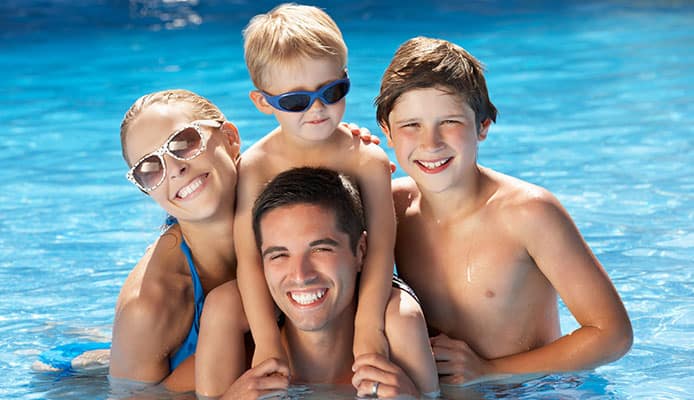
Types of Pool Heaters – Advantages and Disadvantages
Like we’ve mentioned at the beginning, there are three types of pool heaters – gas, electric, and solar. The main difference between them is the energy source they use to heat the water. As you can probably guess, each type has some pros and cons.
Natural & Propane Gas Pool Heaters
This type is probably the most efficient and warms the water fastest. Basically, the unit connects to a natural gas line (or a propane tank) and uses a gas burner to warm up water pipes that pass through.
However, it gives out emissions as a result of this process, and some high NOx models are not allowed in certain areas (mainly California and Texas). While these pool heaters are fairly affordable to buy, they are currently the most expensive to run on a monthly basis.
Solar Pool Heaters
Solar pool heaters rely on solar energy to heat up the pool water. The cold water from the pump goes through the tubing on the solar panels and is warmed up in transition before getting back to the pool.
Even though they are relatively new in the pool heating world, the technology is improving all the time. The upside is that they have no maintenance or running costs. The downside is that they are the most expensive to install and slow to warm the water up.
Electric Pool Heaters (Heat Pumps)
Electric pool heaters are very consistent and energy-efficient which is why they are one of the most popular pool heaters on the market. The higher-rated heater you choose, the less money you will spend per month. Electric pool heaters are also known as heat pumps because of the way they operate.
The great thing about these is that they don’t require much energy and have no harmful emissions. However, they greatly depend on outdoor temperature (to warm up the gas) and won’t work well when it’s cold outside. A huge benefit of heat pumps is that they have excellent longevity and will outlast almost any other heater. If taken care of, these pumps can last for 10 to 20 years.
As an alternative, you also have traditional electric pool heaters. They work similarly to water heaters most of us have at home (electrically heated coil in a water tank). While they can be a bit faster, they often produce higher costs, both initially and in the longer run.
Sizing A Pool Heater
Properly sizing your pool heater is essential for having warm water throughout the season (and perhaps a few months more). When doing the calculations, you need to include pool surface area and volume, ambient air temperature in coldest conditions, as well as targeted water temperature.
Surface Area and Volume of Your Pool
The size of your pool will determine the heater size you need (larger pool requires a more powerful heater). Two things come into play here – surface area and volume. A pool with a large surface area will lose heat faster, meaning that it needs a stronger heater to maintain the temperature. Similarly, higher volume means there is more water to be heated.
Difference between air and water temperature (temperature rise)
Lower air temperature means that the water loses heat faster. In this situation, you will need a more powerful heater to reach the desired temperature in a reasonable time (gas pool heaters are the fastest). Also, sufficient power is required to maintain the water temperature once you reach it.
Type of Pool: In-ground vs Above Ground
Choosing the right type of heater will also depend on whether you have an in-ground or an above ground pool. There are specific heaters for both and, while some are interchangeable, most will work only with one or the other.
For example, the best above ground pool heaters are usually much smaller and more energy-efficient than those made for in-ground pools. Because of this, always make sure to check whether the heater is compatible with your pool.
Initial and Running Costs (Budget)
Total costs for a pool heater can make or break a deal, regardless of how well it works. While none of these are very cheap, there can be significant differences in cost between different types and models.
Gas heaters are probably the most affordable to buy (relative to their power). For a decent initial sum, you can buy a great heater even for a larger pool. However, these are the most expensive in the long run because gas costs a lot of money.
Electric heaters fall somewhere in the middle. While they are a bit more expensive initially, they cost less to run so it evens out after a while. Finally, solar heaters are the most expensive to install but, because they have no running costs, they will pay off after a few years.
You might also like: Pool Heater Installation: How to Install a Pool Heater?
Durability and Warranty Coverage
One of the big concerns when buying pool heaters is how long they are going to last. A gas pool heater is the least durable, usually lasting 5 to 10 years (with proper maintenance).
Electric heaters are a bit more durable, and most can easily last for 10 years. Sun-powered heaters are the most durable, with the best pool heaters lasting up to 20 or more years. The warranty usually reflects the projected durability.
FAQs
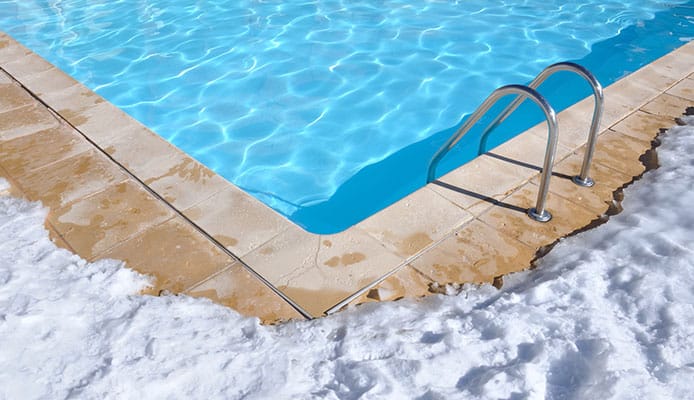
Q: Can I Install A Pool Heater On My Own?
The short answer is yes. If you are confident in your abilities and follow the instructions exactly, you can certainly install a pool heater on your own. The only problem is that if something goes wrong, you may not be covered by the warranty, which could end up costing a lot.
Q: Can Solar Heaters Be Used For Anything Else?
While solar heaters do come with solar panels, these panels are specially configured to connect to your pool pump system and heat the water in your pool. It is our opinion that solar heaters should not be used for anything else.
Q: Are Pool Heaters Efficient Or Environmentally Friendly?
That depends on the type of heater you choose. For example, a gas pool heater is not very environmentally friendly or efficient as it creates harmful emissions. Electric heaters are not the most environmentally friendly, but they are not the worst. The same goes for their efficiency. The most ’green’ option you can get are solar heaters.
Q: Are Pool Heaters Noisy?
Like most other things, it depends on the type and model you’re using. An electric heater might not make any noise at all, especially the more expensive ones. On the other hand, both a solar and a gas pool heater can make some noise depending on the model. Still, this varies from product to product and you should check for each one if this is a concern.
Q: How Much Propane Does A Pool Heater Use?
That is a hard question to answer without knowing the type of propane pool heater you are using, the size of your pool, and the target temperature. If you are heating your pool from cold to hot, you could use up to 4 gallons per hour. You will use a lot less to keep it at the desired temperature.
Q: How Fast Do Pool Heaters Work?
It depends on the heater type, pool size, as well as water and air temperature. This being said, a heat pump (like the ones we reviewed) takes anywhere between 24 and 72 hours to raise the water temperature by 20°F, depending on the variables we mentioned. A gas pool heater will do the job faster but costs more to run, while a solar-powered heater is slower and less reliable on cloudy days.
Q: How To Heat Pool Faster?
There are several ways to get a pool warm faster. First, when building (or setting up) a pool, think about proper placement so it gets a lot of sun exposure. Next, choose darker pool liners because they absorb more heat and indirectly warm up the pool water. Finally, consider getting a solar pool cover that absorbs sunlight and transfers the heat to the water.
Q: How Much Does It Cost To Run A Pool Heater?
This depends on the type of heater you have. A 100,000Btu natural gas heater uses one therm per hour, which comes down to around $1.5 to $2 per hour (depending on the gas price in your area). As for electric heaters, it depends on their wattage.
Q: Should I Leave Pool Heater On Overnight?
No, you don’t have to do this. You can, of course, but this will waste a lot of heat and significantly increase the bill. Heat loss increases with a greater temperature difference, meaning the heater will use even more natural gas or electricity to maintain the temperature during the night.
Q: Do Solar Pool Heaters Work In Winter?
Yes, but not as efficiently. Because there is less sunlight during the day, the sun angles are different, and the air temperature is much lower, a solar heater won’t be able to warm up the pool on its own. In fact, it can only provide around 20% of the needed heat, so you’ll have to use a gas pool heater if you want to swim during the winter.
Q: Do Solar Water Heaters Work At Night?
Since they rely on sunlight to heat the water, a solar heater for pool cannot warm up water during the night. However, if the system has an insulated water tank for storing hot water, it can add it to the pool during the night too. Still, most solar-powered heaters are backed up by natural gas or electric heaters for using during nighttime or on cloudy days.
Q: How Do You Protect A Pool Heater?
Taking proper care of your pool heater means fewer issues, less maintenance and, ultimately, less money in the long term. Here are some useful tips to protect your pool heater:
- Keep the pool chemistry balanced (pH between 7.2 and 7.8, chlorine up to 10ppm)
- Make sure to closely follow installation instructions (or have a professional install it)
- Make sure the metal casing is electrically bonded (prevents shocks and short circuits)
- Prevent any backflow into the heater (install a safety valve after the heater)
- Make sure the pool pump has sufficient power to provide a good flow
Globo Surf Overview
A pool heater is a great way to extend the summer season and make the pool more enjoyable. Since this is not something you buy every day (and it’s also very costly), you should precisely calculate your heating needs and find the most efficient pool heater that can get the job done.
Hopefully, our guide has given you the pointers you need so you never have to swim in cold water again. Believe us when we say that a heated swimming pool is guaranteed to become a great source of fun for friends and family.
More Above Ground Pool Reviews:
More Heater Reviews:


